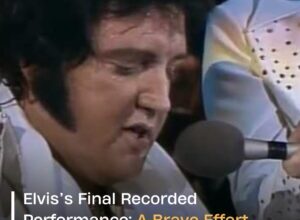Listen to his powerful voice; truly talented and gifted. His music will endure for eternity.
“You Gave Me a Mountain” is a song that stands out in the vast repertoire of Elvis Presley, not only for its poignant lyrics but also for the deep emotional connection Elvis brought to his performance. Written by the legendary country singer-songwriter Marty Robbins in the 1960s, the song was originally intended to reflect the hardships and trials of life. Robbins, known for his storytelling ability through song, crafted “You Gave Me a Mountain” as a narrative of resilience and perseverance in the face of overwhelming challenges. The lyrics capture the essence of struggle and the human spirit’s capacity to endure, themes that resonated deeply with both the songwriter and the performers who later covered the song.
Elvis Presley’s rendition of “You Gave Me a Mountain” during his iconic “Aloha from Hawaii” concert on January 14, 1973, remains one of the most memorable performances of his career. The concert itself was a groundbreaking event, broadcast live via satellite to an estimated 1.5 billion viewers worldwide, making it one of the most-watched television events at the time. The concert was a testament to Elvis’s global appeal and his ability to connect with audiences across different cultures and backgrounds. Amid this historic backdrop, “You Gave Me a Mountain” emerged as a poignant moment in the show, showcasing Elvis’s vocal prowess and his deep connection to the song’s themes.
Presley’s performance of the song was characterized by his trademark emotional intensity. From the first note, it was clear that this was not just another song in the setlist; it was a personal statement. Elvis, who had faced his own share of struggles and challenges in life, brought a unique authenticity to the performance. His voice, rich with experience and emotion, conveyed the weight of the lyrics in a way that only he could. The audience, both in Hawaii and those watching from around the world, were captivated by the raw power and vulnerability in his voice. It was a moment that underscored why Elvis was not just a performer, but a storyteller who could touch the hearts of millions.
The song’s lyrics describe a man who has been through many hardships, yet finds strength and solace in the love of his partner. Lines like “You gave me a mountain this time” and “This time, Lord, you gave me a mountain, a mountain I may never climb” speak to the overwhelming nature of the challenges he faces. Yet, there is a sense of resilience and determination that permeates the song, a message that resonated with many of Elvis’s fans who saw parallels in their own lives. The universal themes of struggle, love, and perseverance made “You Gave Me a Mountain” a song that connected deeply with audiences.
Elvis’s interpretation of the song during the “Aloha from Hawaii” concert also featured an expanded version that included an introduction by the concert’s emcee, Jack Lord, and an extended instrumental section. The latter provided a showcase for the talents of Elvis’s band, particularly the guitar solo by James Burton. Burton, a legendary guitarist in his own right, added a layer of intensity to the performance with his skillful playing. The interplay between Elvis’s vocals and Burton’s guitar work created a powerful dynamic that elevated the song to new heights. This collaboration between Elvis and his band was a testament to the mutual respect and understanding they shared as musicians.
Beyond the musicality, it was Elvis’s delivery of the song that left a lasting impression. He sang with a sense of vulnerability that was palpable, giving the audience a glimpse into his own struggles and emotional depth. Elvis was known for his ability to convey a wide range of emotions through his music, and “You Gave Me a Mountain” was no exception. The sincerity in his voice as he delivered each line resonated with listeners, making the performance one of the standout moments of the concert.
The “Aloha from Hawaii” concert as a whole was a significant event in Elvis’s career, marking a peak in his later years as a performer. The concert was not only a display of his enduring popularity but also a reaffirmation of his status as one of the greatest entertainers of all time. “You Gave Me a Mountain,” with its powerful message and Elvis’s heartfelt rendition, was a key component of the concert’s success. It demonstrated his ability to connect with his audience on a deep emotional level, a quality that had been a hallmark of his career since the beginning.
Elvis Presley’s legacy as a performer is built on moments like his performance of “You Gave Me a Mountain.” His ability to take a song and make it his own, infusing it with personal emotion and meaning, is what set him apart from other artists of his time. This performance, in particular, showcased the depth of his talent as both a vocalist and a performer. It was a reminder of why, even decades after his passing, Elvis remains a beloved figure in the world of music.
Marty Robbins, who wrote the song, was himself an influential figure in country music, known for his evocative songwriting and his ability to capture the human experience in his lyrics. Robbins’s work has been covered by many artists over the years, but it was Elvis’s version of “You Gave Me a Mountain” that brought the song to a global audience. Through Elvis, the song reached new levels of popularity and became an enduring classic, showcasing the timeless appeal of Robbins’s songwriting.
In the years since the “Aloha from Hawaii” concert, “You Gave Me a Mountain” has remained a significant part of Elvis’s musical legacy. It continues to be celebrated as one of his most powerful performances, a moment in time when the King of Rock ‘n’ Roll laid bare his soul for the world to see. The song, and Elvis’s rendition of it, is a reminder of the power of music to express the deepest emotions and to connect people across generations. It is a testament to the enduring impact of both Elvis Presley and Marty Robbins, two icons whose contributions to music will never be forgotten.



